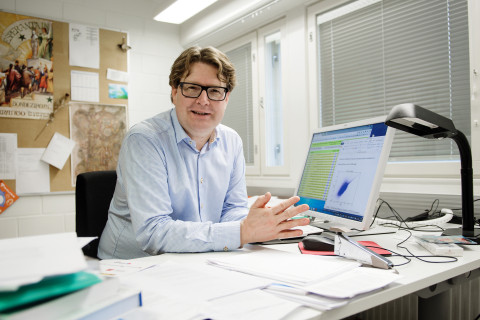Thanks to digitalisation, new windows of opportunity have opened up for language scholars and students in languages and linguistics. New types of research materials and new processing skills are changing the ways we think about language studies.
Universities are currently investing in the digital humanities. I believe that students who understand linguistics and have programming skills will have no trouble finding a job in the future,” says Professor of English Mikko Laitinen.
According to Laitinen, the core of the humanities will remain unchanged, but technological advances will also turn the humanities into something digital. In the past, research materials were static, and researchers spent years collecting and analysing them. Nowadays, electronic corpora are constantly being updated in real time.
“This is collaboration between many different fields. A linguist determines what is studied, a programmer analyses the data, and a visualiser can pinch in by making a visual presentation of the findings. Naturally, the more one can do on his or her own, the better the employment prospects.”
Language is a foundation for many things. This is something scholars of the humanities have always known, but researchers of other fields, too, are now starting to realise this.
“When we operate online, we constantly leave linguistic footprints. These serve as a never-ending source of research material for linguists, and these linguistic footprints can be utilised in many ways outside academia,” Laitinen says.
“For example, two of the world’s most valuable companies, Facebook and Google, do not own anything concrete in the traditional sense of things. They have merely taken into use and harnessed linguistic data produced by us humans.”
By mining digital masses of data, it may be possible to predict future trends.
“Special skills are needed to analyse linguistic data. This data provides us with a better understanding of humans and society. For example, we can analyse consumer behaviour, political aspirations, or detect hate speech.”
The University of Eastern Finland is currently involved in a collaborative project that studies linguistic data from Twitter alongside more traditional materials. In this project, researchers analyse differences between materials that are static and corpora that are updated in real time.
“In my experience, the curriculum for language and culture students should include the basics of programming. This might also inspire a completely new group of students to take up linguistics and language studies.”
Photo caption (main image): According to Mikko Laitinen, linguistic data can provide a better understanding of humans and society.
